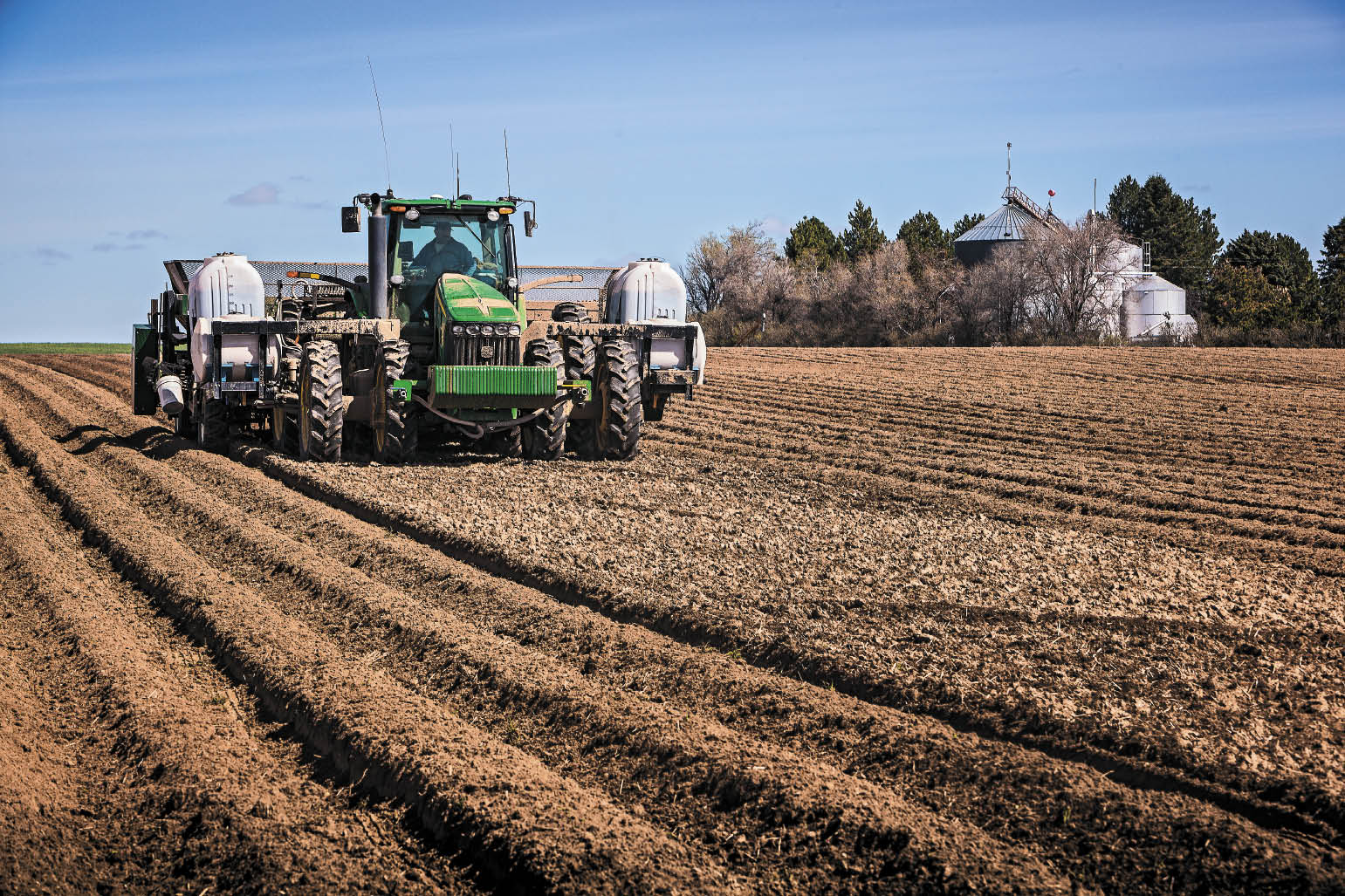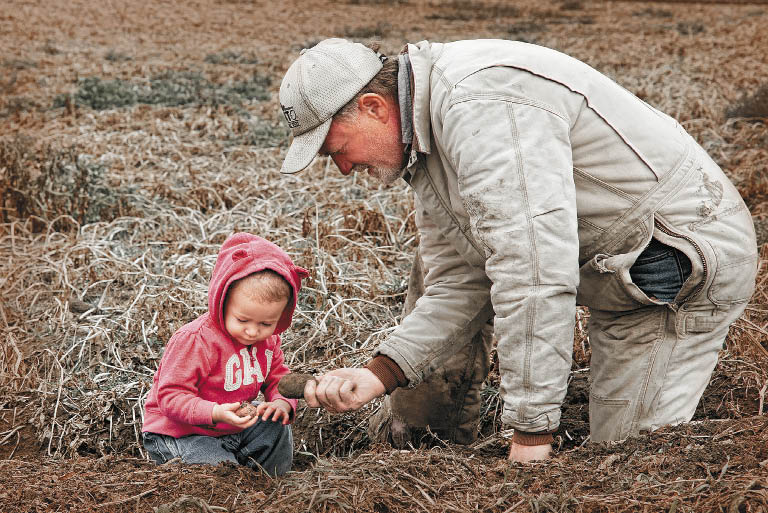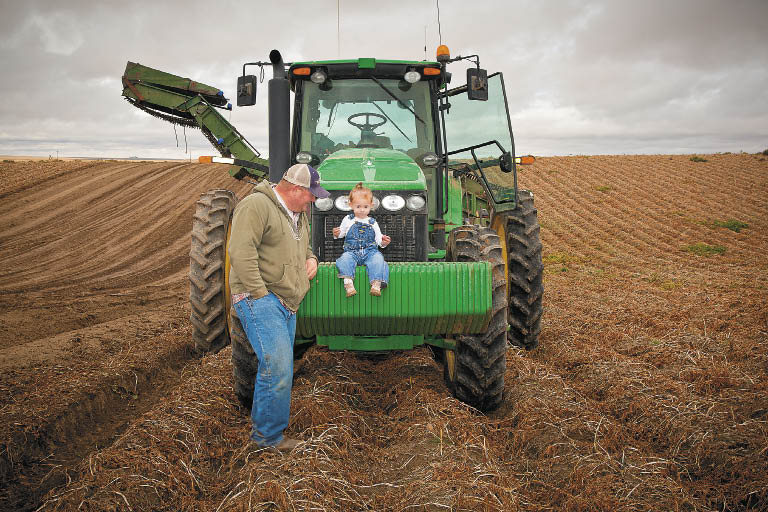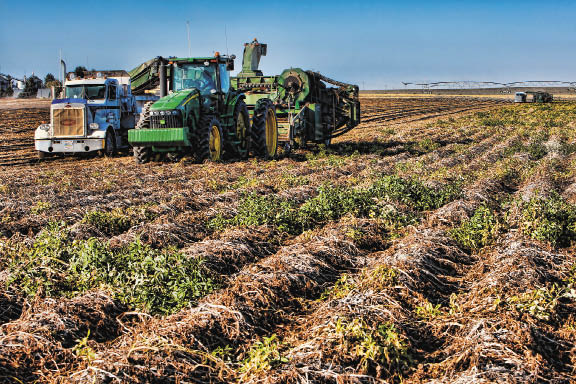 When most people graduate from college, it takes them some time before they can start that first job.
When most people graduate from college, it takes them some time before they can start that first job.
Nick Johnson graduated at 8 a.m. on a Saturday morning and was on the tractor at 6 a.m. the following Monday-two days later.
Johnson, 32, a Connell, Wash., native and fourth-generation grower (third for potatoes), knew from an early age what he wanted to do. And he loves what he does, even during the rough times.
Johnson Agriprises
The Johnsons moved to the small town in the Columbia Basin in 1906, and they've been there ever since. They've now farmed in the area for a century, but it was in the late 1960s when Nick's grandfather started growing potatoes. They've expanded acreage every year, and now have 2,200 acres of potatoes-the most the operation has ever grown.
Johnson Agriprises is run by Nick's father, Gavin, and Gavin's brother, Orman. Ninety percent of their potatoes go to the Lamb Weston facility in Connell; the other 10 percent is grown organically for the fresh market. Their Lamb Weston varieties include Russet Burbanks, Rangers and Umatillas. Their organic varieties include a line variety of Russet Norkotah, as well as Yukon Gems and Rodeo, an HZPC-licensed, smooth-skinned, long red variety with pale yellow-colored flesh.
Their rotational crops include wheat, seed peas, and, to a lesser extent, bluegrass. Until 2010, they were growing a lot more bluegrass than they are now. On the organic side, they grow onions, asparagus and some mint.
The Johnsons start planting potatoes the end of March. Harvest begins on the colored varieties the end of August, followed by the Norkotahs and the other varieties in mid September.
"[We dig] whenever Lamb tells us to dig," he says. "Everything we do for Lamb goes to storage, so mid-September is the earliest we dig for them."
 In the Columbia Basin, late blight is always a concern, but Nick says they've been pretty fortunate the last few years to not have a lot of pressure from it. It also helps that their management program has them scouting every field, three to four times a week, with three or four different pairs of eyes.
In the Columbia Basin, late blight is always a concern, but Nick says they've been pretty fortunate the last few years to not have a lot of pressure from it. It also helps that their management program has them scouting every field, three to four times a week, with three or four different pairs of eyes.
"We're in our fields constantly checking for disease, pest damage or whatever," Nick says. "The only way we can try to fix a problem or control a problem is to know when it's happening-not after it has happened. We spend a lot of time walking fields in the summer time."
This year, all their fields are under irrigation pivots-even small fields, where they've built some mini-circles from leftover pivot parts. So, for the Johnsons, that means no more moving hand lines.
"My kid is going to grow up in a world without hand lines," he says, then adds jokingly, "I don't know what I think about that!"
 New Generation
New Generation
Nick graduated high school in Connell in 1998. Being about halfway between Othello and Connell is a bit confusing for some people. The Johnsons have a Connell phone number and an Othello mailing address.
"Because we're in Adams County, we're considered Othello, but we claim Connell because that's where we went to school, where we go to church," he says.
After graduating high school, he attended Washington State University in Pullman, a family tradition for sure-many of his family members, including great-grandparents and even a grandmother who lettered in three sports, have been Cougars.
As a matter of fact, on State Highway 26, just to the north of their farm, they have a 400-foot-long potato storage with large, red letters on both sides, that read, "Go Cougs." The letters are 27 feet by 27 feet in size-large enough that no one travelling Highway 26, whether heading toward or away from Pullman-can possibly miss them.
Nick graduated with a bachelor's degree in ag business in 2002, going straight back to work on the farm two days later. He's been married to a local, Kate (who also grew up on a farm nearby) for the past six years. She works in the office at Johnson Agriprises, doing finances and billing for Lamb Weston. Nick and Kate have a two-year-old daughter named Kamryn.
"She's fifth-generation from two family farms," Nick says, proudly.
Nick isn't sure when he'll start the process of working his way into partial ownership in the family business, which is largely up to his father and uncle. Orman is near retiring age and has indicated he wants to start scaling back, but Nick's father doesn't have any intention of retiring for another 10 to 15 years.
"I think with grandkids being here on the farm, he's not going anywhere anytime soon."
 Plaques on the Wall
Plaques on the Wall
Nick is serving on the Washington State Potato Commission, in the process of renewing his term. He says it's been a good experience to expose him to all the different facets of the industry.
"We've got a lot of people willing to fight for our industry and what they hold dear," he says. "If it wasn't for the folks who are willing to put their time in, I think this would've all ended years ago."
Nick loves what he does, but it's not always sunshine and lollypops to make a successful operation run. It takes a lot of hard work, and, perhaps, a little dash of dumb luck to make it all come together. But the love of the job is what keeps them going.
"There are times when it's 10 o'clock at night and you're changing a flat on a circle, cursing at it, wondering, `Why am I doing this?' But when you see that circle running the next day, and when that crop ends up being a 40-ton crop, it was worth it."
When the season is over, looking back at the previous season is when they understand the hard work was worth it.
"You have to want it and love it," he says. "If you're just doing it as a job, you won't make it. There are years when we've been able to get a bonus or have certain things, and there are years when it's pretty lean, and you have to accept that. That's just part of the cyclical nature of farming."
The Johnsons depend on their reliable crew, which has an average length of employment of over a decade, of the 12 full-time employees. A couple of them have been working for them for close to 20 years.
Their reliable crew, love for the job and relentless pest/disease management program is what brings in awards year after year from Lamb Weston.
"That's just a testament to the time we put in. If we weren't spending as much time in the field, we wouldn't be putting plaques on the wall at the end of the season. It's fun. All the plaques are down in the shop, and the guys take a lot of pride in those awards."
Nick hopes that their family is still farming for another hundred years.
"Very few family businesses have survived a century, and very few farms have survived a century. To be able to claim both of those-I'm very proud of that."